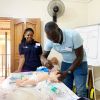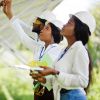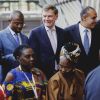“Our goal is for people to survive”
Handing out food, building wells, saving human lives: this is how Germany provides humanitarian assistance to the population of South Sudan.
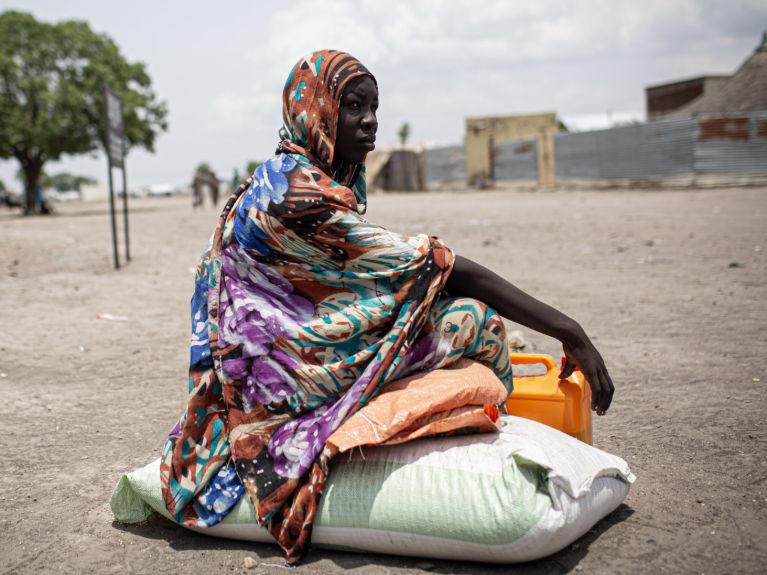
The sun is high in the sky above Kodok, 650 kilometres south of Khartoum on the western bank of the White Nile. A woman in a pink garment is on her way home, carrying two heavy sacks on her shoulders. Her children are waiting for her in the shade offered by a makeshift tent made of branches and tarpaulins. “Her face lit up when she got the food,” Caritas South Sudan Project Officer Kim Nicolai Kerkhof recalls. The woman went on to tell him that her husband had been shot dead in an attack and that four of her children had been abducted. She didn’t have time for grief. She had to survive and feed her family. “This is the exact goal of humanitarian aid,” Mr Kerkhof says. “To make sure that people survive at all.”
South Sudan is one of the world’s poorest countries. Armed conflicts, drought and flooding force people to flee within the country. The situation is further aggravated by the war in neighbouring Sudan, as many people from there are fleeing to South Sudan, a country that is extremely poor itself and is affected by many years of violence.
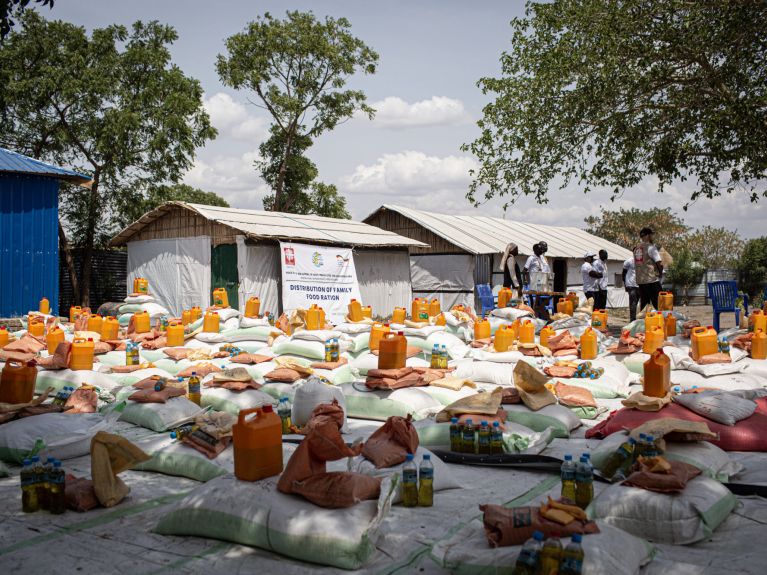
Germany – one of South Sudan’s largest donors of humanitarian aid
Germany supports South Sudan as one of its largest donors of humanitarian aid and has made around 35 million euros available in 2025 alone. The Federal Foreign Office supports, for example, the Caritas project “Multi-sectoral humanitarian assistance in difficult to access regions affected by conflict or flooding in the Democratic Republic of the Congo and South Sudan”. The project receives a total of 16.7 million euros in funding, of which 6.2 million euros were used to date to support South Sudan. “The most important component is food security,” Mr Kerkhof says about the part of the programme that focusses on South Sudan. The food handed out includes sorghum, beans, salt and oil, with seeds and oxploughs, for example, provided later on. “The fundamental idea of the project is to first bring people back into a physical condition that enables them to grow something themselves.”
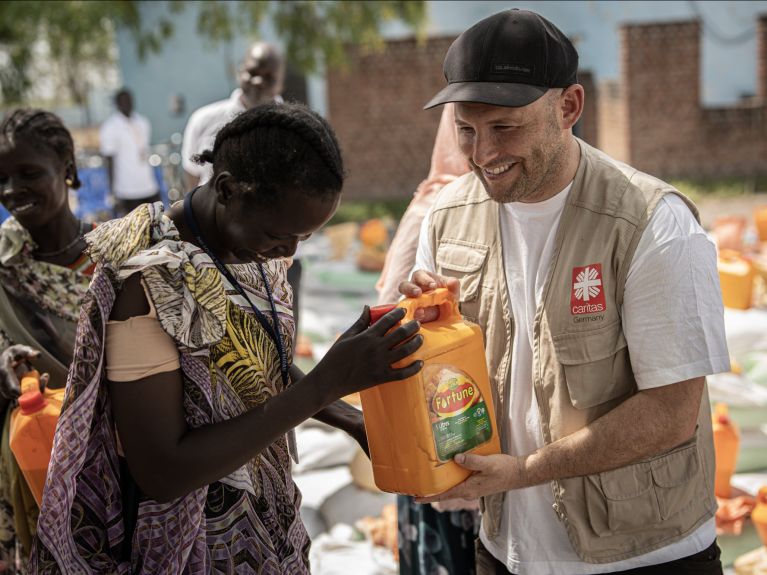
The project is running until the end of August 2026, helping at least 150,000 people in South Sudan during its three-year duration. Caritas cooperates with four established local partners: the Society of Daughters of Mary Immaculate and Collaborators (DMI) in Kodok, the Bishop Gassis Relief and Rescue Foundation (BGRRF) in Abyei, Africa Development Aid (ADA) in Fangak and the Mary Help Association (MHA) in Wau. These partners are in charge of the project’s implementation and they are in close contact with the local population. “Almost everyone who lives in these regions is in need and requires support,” Mr Kerkhof says.
Help for victims of sexualised violence
Wells are built as part of the project and people are provided with stoves that need less wood. “Gathering fire wood is a very dangerous activity for many women,” Mr Kerkhof points out, adding that they often had to walk long distances and that sexual assault occurred frequently. Two of the partner organisations are also offering psychological and medical care for victims of sexualised violence. In addition, the programme includes so-called cash-for-work projects: those who help to build dams or bridges are paid, enabling them to provide for themselves.
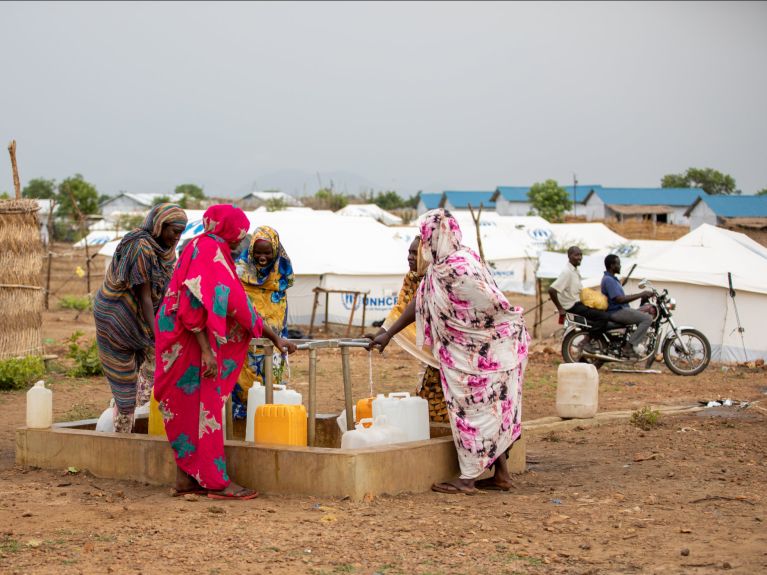
With its “Multi-sectoral humanitarian emergency aid programme for vulnerable population groups in sub-Saharan Africa” the Catholic aid organisation Malteser is also active in South Sudan with support from the Federal Foreign Office. The three-year project is running until the end of August 2026 and receives a total of EUR 30.3 million in funding, around EUR 5.8 million of which have been used in South Sudan to date. Around 170,000 people are benefitting from this aid. “The goal of the programme from our organisation’s point of view is to cover urgent humanitarian needs of the affected population across the entire region,” says Yonathan Qama, the Malteser Country Coordinator for South Sudan.
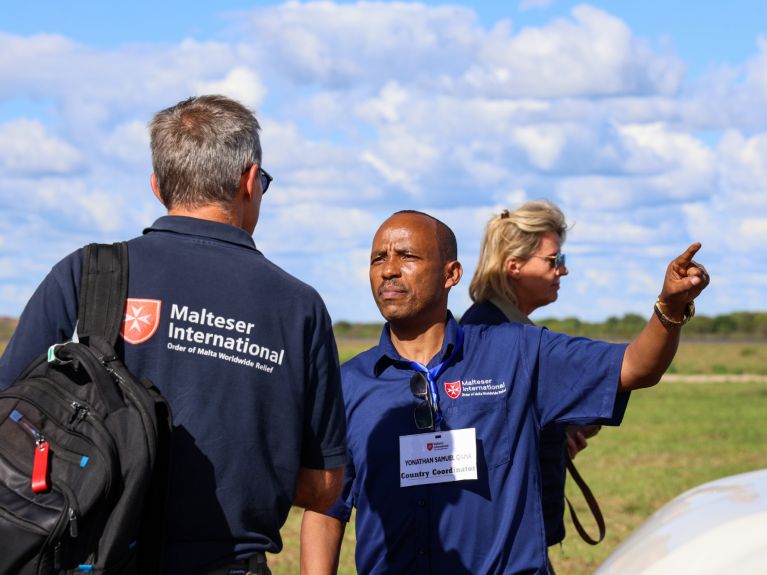
Safeguarding human dignity
The specific goals are to improve access to clean water and to promote hygiene in order to prevent disease, “and to safeguard human dignity,” Mr Qama explains. The project also aims to give hope, for example by serving meals to students who are not only fed this way but also encouraged to attend school. Restoration and maintenance of healthcare facilities is another part of the Malteser project, alongside aid-in-cash for people in need. This is done to provide at least temporary support for households which are run by women or that include people with disabilities or a large number of children or elderly people.
